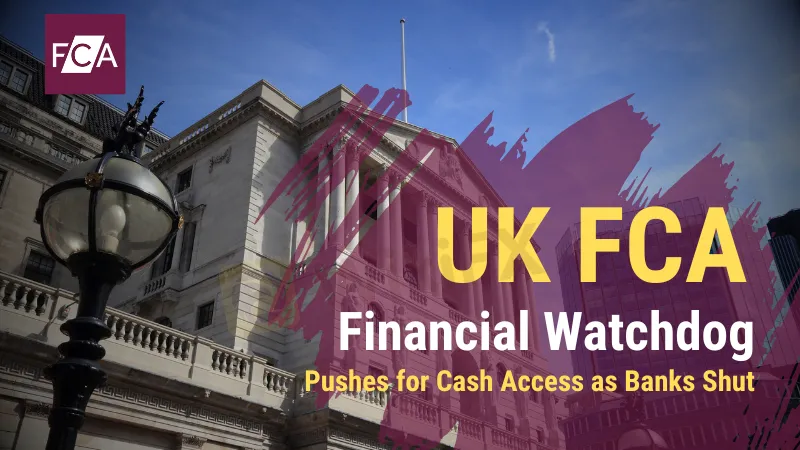简体中文
繁體中文
English
Pусский
日本語
ภาษาไทย
Tiếng Việt
Bahasa Indonesia
Español
हिन्दी
Filippiiniläinen
Français
Deutsch
Português
Türkçe
한국어
العربية
UK FCA Financial Watchdog Pushes for Cash Access as Banks Shut
Abstract:The UK's FCA is implementing new measures to ensure cash access amidst widespread bank branch closures, prioritizing alternatives and inclusivity in the digital banking era.

In a crucial step to protect the public's access to cash, the UK's financial watchdog, the Financial Conduct Authority (FCA), has revealed intentions to apply new safeguards to slow the fast closure of bank branches throughout the country. This program is in response to growing worries about the declining availability of physical banking services, which have suffered a severe decline with over 5,800 branches closing since 2015, averaging 54 closures per month.
The FCA's declaration came at a critical moment, as politicians and the general public were becoming outraged by the rising number of “shameless” bank branch closures. These closures have generated concerns about the possible consequences, particularly for disadvantaged groups and isolated populations who depend significantly on cash transactions for their daily necessities.
To address these problems, the FCA plans to implement regulatory authorities later this year that will allow it to require banks to offer a full reason for any proposed branch closures. Banks will be asked to indicate how they aim to preserve cash access for their clients by presenting feasible alternatives to the existing branch network.

During a recent session with the Treasury subcommittee on financial services, David Geale, the FCA's director of retail banking, highlighted that the regulator's priority isn't only to keep bank branches running. Instead, the FCA intends to guarantee that banks provide alternative cash access options, such as collaborating with local post offices, installing free-to-use ATMs, or developing multi-bank clusters.
Although the distribution of these banking centers has been slower than expected, with just 30 operating out of the projected 100, Geale said that efforts are ongoing to hasten their deployment, with the goal of increasing the number to 50 by Easter.
The FCA's approach is part of a larger goal to maintain a balanced financial environment, which recognizes the transition toward digital banking while ensuring that cash remains a viable choice for all parts of the population. This is especially important as the Bank of England and the Finance Ministry consider the introduction of a digital pound, with guarantees that such a move would not replace the need for real currency.
The FCA's proactive approach to ensure cash access demonstrates its commitment to a fair and inclusive banking system, ensuring that no one is left behind as the industry transitions to digital finance. As the UK navigates the changing banking and financial environment, the FCA's regulations are an important step toward maintaining the basic right to cash access, especially for those who rely on it the most.
For additional information and updates on this developing subject, check out WikiFX's daily news at https://www.wikifx.com/en/news.html.

Disclaimer:
The views in this article only represent the author's personal views, and do not constitute investment advice on this platform. This platform does not guarantee the accuracy, completeness and timeliness of the information in the article, and will not be liable for any loss caused by the use of or reliance on the information in the article.
Read more

SEC Approves Hashdex and Franklin Crypto ETFs on Nasdaq
The SEC has approved crypto index ETFs by Hashdex and Franklin Templeton, including Bitcoin and Ethereum, marking a milestone in crypto asset investment.

North Korean Hackers Steal $1.3bn in Cryptocurrency in 2024
Over $2.2bn in cryptocurrency stolen in 2024, with North Korean hackers accounting for $1.3bn. Discover how cyber theft impacts the evolving crypto landscape.

ASIC Sues Binance Australia Derivatives for Misclassifying Retail Clients
ASIC accuses Binance Australia of misclassifying 500+ retail clients as wholesale, denying key consumer protections for crypto derivatives. Penalties and reforms are underway.

Revolut Leads UK Neobanks in the Digital Banking Revolution
Revolut dominates the UK neobanking scene with 15.6M downloads in 2024, surpassing traditional banks. Explore how innovation drives this fintech leader’s growth.
WikiFX Broker
Latest News
Geopolitical Events: What They Are & Their Impact?
Top 10 Trading Indicators Every Forex Trader Should Know
ASIC Sues Binance Australia Derivatives for Misclassifying Retail Clients
WikiFX Review: Is FxPro Reliable?
Malaysian-Thai Fraud Syndicate Dismantled, Millions in Losses Reported
Why Do You Feel Scared During Trade Execution?
WikiFX Review: Something You Need to Know About Markets4you
Revolut Leads UK Neobanks in the Digital Banking Revolution
Fusion Markets: Safe Choice or Scam to Avoid?
SEC Approves Hashdex and Franklin Crypto ETFs on Nasdaq
Currency Calculator


